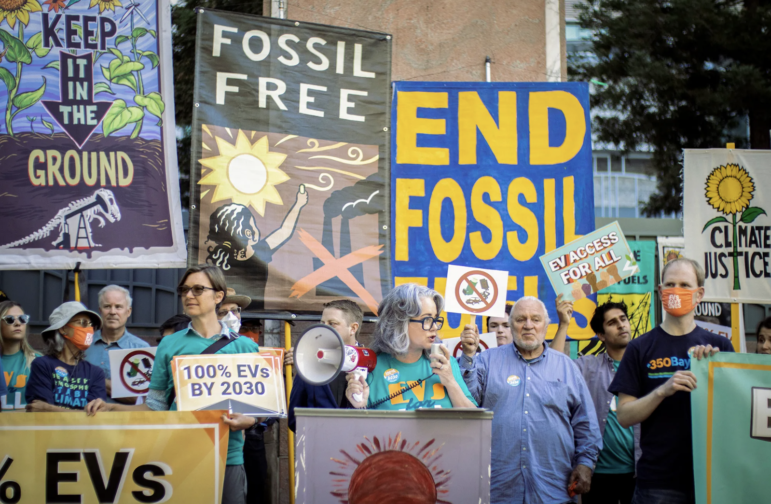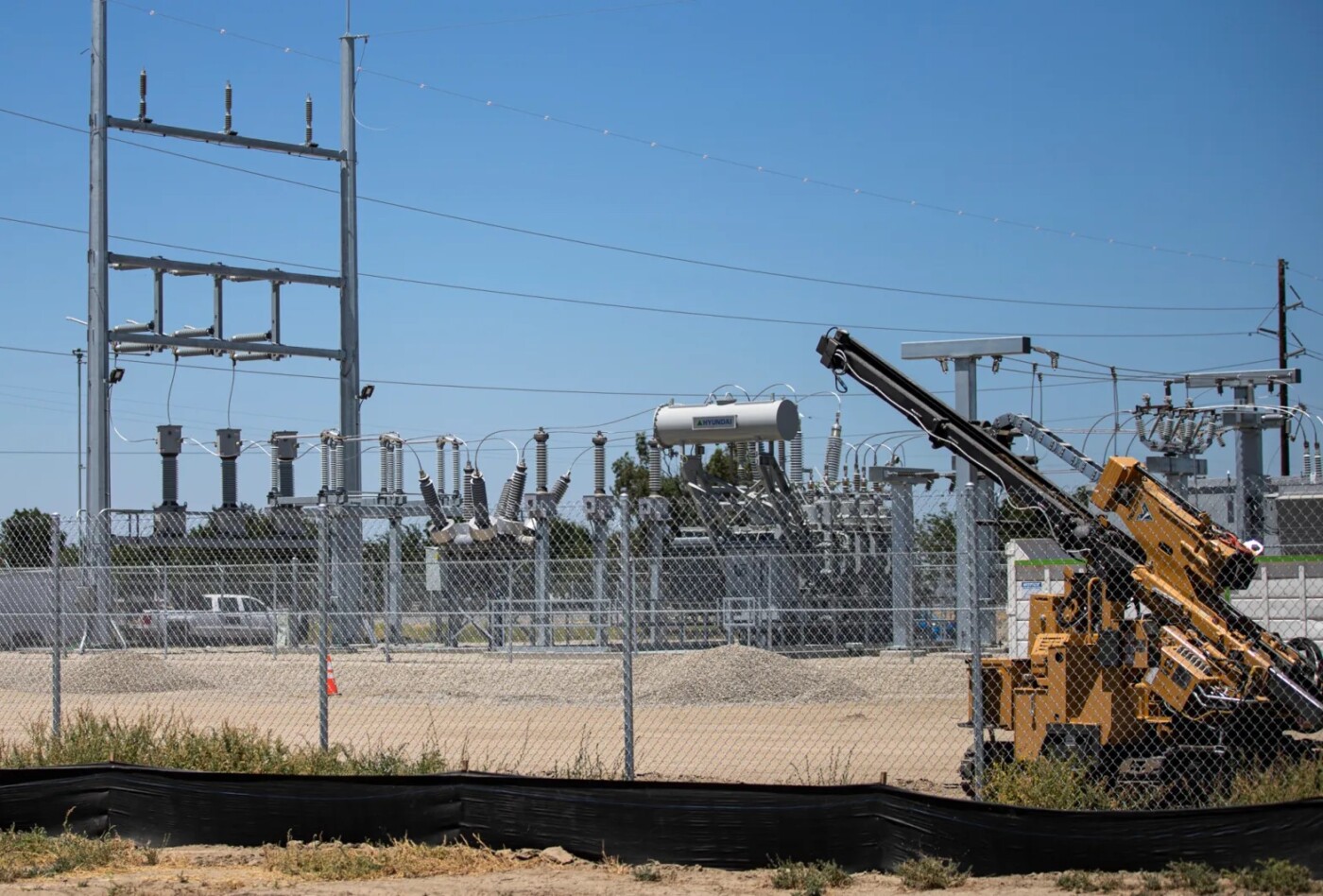Gov. Gavin Newsom signed two closely-watched, first-in-the-nation bills on Saturday that will force large companies to disclose their greenhouse gases that contribute to climate change and their financial risks.
Newsom approved Senate Bill 261, which requires large companies to biennially report their financial risks from climate change. But he said in a statement that he will work with the Legislature on relaxing the law’s 2026 implementation date because the California Air Resources Board won’t have “sufficient time to adequately carry out the requirements.” He added that he also is “concerned about the overall financial impact of this bill on businesses, so I am instructing CARB to closely monitor the cost impacts.”
“I look forward to working with the Legislature on these outstanding items to ensure that the bill’s intent is achieved,” he said.
Under the new law, more than 10,000 companies with revenues exceeding $500 million to detail how climate change threatens the profitability and financial stability of their operations, not just in California, but around the world. Examples are high temperatures, wildfires, droughts and other natural conditions altered by climate change.
Newsom also signed Senate Bill 253, but voiced similar concerns about the deadline. Under that groundbreaking bill, beginning in 2026, about 5,300 U.S. corporations earning more than $1 billion and doing business in California must annually report their global emissions of carbon dioxide and other planet-warming greenhouse gases.
“The implementation deadlines in this bill are likely infeasible, and the reporting protocol specified could result in inconsistent reporting across businesses subject to the measure. I am directing my Administration to work with the bill’s author and the Legislature next year to address these issues,” Newsom said.
In the final weeks of California’s legislative session, business groups, growers and oil companies intensely lobbied lawmakers to reject the greenhouse gas bill, calling it unworkable and likely to lead to inaccurate reports of emissions. Environmental groups, big tech companies Apple, Google, Microsoft and Salesforce, and some global corporations that emphasize sustainability, including IKEA, supported it.
Any company that meets the revenue threshold and sells or produces goods or services in California will have to comply, including such large, global corporations as varied as Amazon, Chevron, McDonalds, Kroger and Walmart.
Businesses must report not only the tons of gases they emit globally from all of their own global operations and energy use, but also from less-direct sources, such as their supply chains, contractors and even consumers’ use of their products.
These indirect sources, called “Scope 3” emissions, have raised the concerns of business groups. Business groups said the estimates could be inaccurate, resulting in misguided public policy, while putting an onerous burden on companies.
Last month, state Sen. Scott Wiener, a Democrat from San Francisco who authored the greenhouse gas bill, amended it to give companies until 2030 before fines for inaccurately reporting emissions from those less-direct sources would kick in. The companies will still have to report emissions from their operations and their energy use beginning in 2026. But the reports of emissions from suppliers and consumers wouldn’t begin until 2027 — and the companies won’t be penalized for inaccurate reports for the first few years.
The emissions disclosures will have to be independently verified by an outside consultant, “an independent third-party assurance provider.”
The aim of the legislation is to hold large companies accountable for the role they play in climate change. For years, many businesses have marketed themselves as environmental stewards while failing to fully disclose their emissions.
Increased corporate transparency on emissions could lead to highly publicized “top polluters” lists that make major corporations more accountable — and uncomfortable — since their full role in causing climate change would be exposed.
The greenhouse gas bill passed off the Assembly floor with an initial vote of 41-20, then cleared the Senate in a final, 27-8 vote. Last year, a similar bill failed in the state Assembly on the last night of the legislative session.

“These disclosures are simple but transformational, which is why companies like Apple are already reporting their emissions and calling them essential to their corporate climate goals,” Wiener said in a statement last month. “We need strong transparency to create a level playing field among private and public companies. Once again, California is leading the nation on essential climate action.”
Economic activity has long been the principal driver of the world’s changing climate, and for the last two decades, organizations have sought uniform standards for reporting corporations’ greenhouse gas emissions.
The United Kingdom already requires companies to report emissions, and the European Union will begin requiring the reports in 2025.
Meanwhile the Biden administration’s U.S. Securities and Exchange Commission has proposed a rule that would require publicly traded companies to report verified greenhouse gas emissions and climate-related financial risks. But the federal efforts — which do not include private companies — have met fierce opposition from business groups.
Of the 5,300 U.S. corporations that would have to report their emissions under California’s bill, about 73% are privately held companies, according to sustainability group Ceres.
“In California, we would be leading the way with a gold standard that in a lot of ways would do the work that can’t happen for all kinds of reasons in D.C. right now,” said Catherine Atkin, a climate attorney who formed the group Carbon Accountable to advocate for the bill.
Opposition came from the California Chamber of Commerce and consortiums of large and powerful industry groups: the Western States Petroleum Association, which represents oil companies, the Western Growers Association and and the Securities Industry and Financial Markets Association, which represents stockbrokers and investment bankers.
“Companies are going to have to start communicating not on the fact that they are carbon neutral — which usually didn’t mean anything — but that they are on the path to reduction,” said Alexis Normand, chief executive of Greenly, a carbon accounting start-up.
“You’re going to start being judged on the pathway,” he said, “so that’s a big change.”
The new financial risk law requires the companies to define risks by adhering to rules created by The Financial Stability Board, an international financial regulatory body. About 80% of the 10,400 affected companies will be private, according to the sustainability group Ceres.
The reports must include vulnerabilities to shareholder value, consumer demand, supply chains, employee safety, loans and other economic threats that may be amplified by changing climate and more extreme weather events.
CalChamber lobbyist Brady Van Engelen called the risk reports “a gold-plated exercise in gathering information.”
The new law comes as climate change is contributing to more heat waves, swings between droughts and floods, wildfires and hurricanes — all of which pose economic risks to large corporations. As of June 8, the National Oceanic and Atmospheric Administration had confirmed nine disasters exceeding $1 billion in impacts this year. The annual average over the previous five years was 18, compared with only eight each year from 1980 to 2022, adjusted for inflation.
